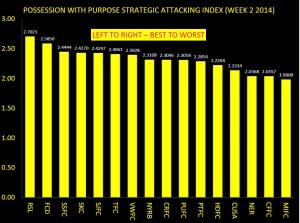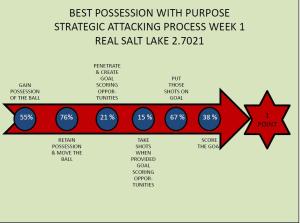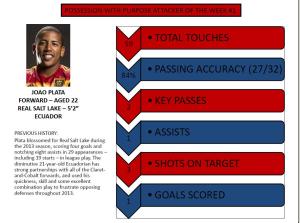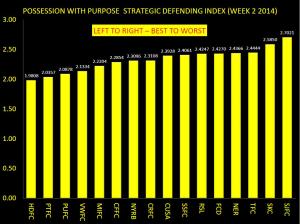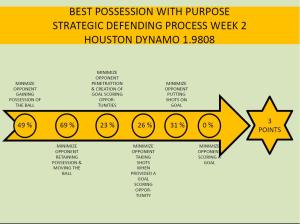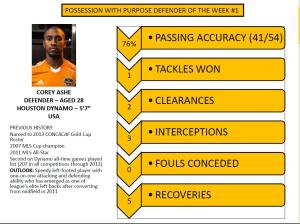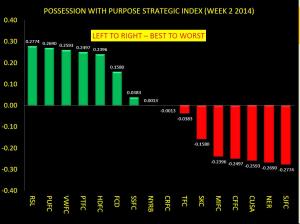MLS Possession with Purpose Week 2: The best (and worst) performances
/In case you missed it, I will be offering up a series of related articles throughout this season focusing on my Possession with Purpose analysis - a drive towards developing a simplified, yet systematic, statistically-based rating approach on Strategic Team performance (both attacking, defending and cumulative) in executing the Six Steps of PWP. Part of this effort also includes highlighting individual players who have had a significant role in how a team performed that week. I don't claim to say that 'the player' selected is the best player on the team but it is intended to show how one players' activities help influence a team outcome. If you haven't read the introduction and explanations to PWP click here for more details.
For this week my article focuses strictly on team performance for Week 2; an additional article may be offered up later this week that covers the cumulative PWP Indices for the first two weeks; if I get it posted I'll paste a link here.
The top PWP Strategic Attacking team for week 2 was Real Salt Lake; that may come as a bit of a surprise given some other outcomes this past week - more later on that; but a good thing to remember is that high strategic ratings for RSL are not unusual given their penchant for possession and some pretty good goal scoring ratios based off shots taken and shots on goal.
Here's the breakout on how they performed in each of the six steps of PWP:
The RSL Attacking Team Player of the week is Joao Plata; here are some highlighted individual statistics that helped influence team performance...
The bottom feeder in Strategic attack this week was the Montreal Impact (1.9808). Some internal key indicators used to develop that rating included being 5th lowest in Total Passes (389); 5th lowest in Passing Accuracy at ~69%; 8th lowest in Passes within their Attacking Third; 10th highest # of Passes completed in the Final Third (62); 5th best with 16 Shots Taken with 5 Shots on Goal (tied for 6th best) yet no goals scored.
Other teams were less productive in some cases but the summation of all those indicators pointed to Montreal as being the least effective and efficient as a Team in Attack.
Now how about Jermaine Defoe and Toronto FC? He had two goals in a blinding win for the Reds visiting Seattle. Is there a reason why Toronto didn't get the best PWP Attacking team this week? A good question, and here's why they missed out.
Recall from last year that one of the top attacking teams in MLS was Vancouver - yet on the defending side they were not quite so fortunate. Also note that both Chicago and Dallas also had on average (and in total) more goals scored than 3 other teams making the Playoffs.
In reviewing the intent of PWP; it's not intended to mirror outputs that directly match goals scored; if it was then the PWP Composite Index for last year would have been 70% accurate as opposed to 90% accurate. For now let's just say that Toronto did a great job in taking 3 points in Seattle - it's a long season with many games yet to be played. So the analysis doesn't snub Toronto - it simply attempts to better recognize that Real Salt Lake had a more comprehensive team attack than Toronto.
Unlike last week, the top Defending team performance did not come from the top attacking team; recall RSL gave up 3 goals-against in their draw with San Jose.
The top Defending team this past week were the Houston Dynamo. Given Montreal were the bottom feeder in Attack it only makes sense that the most effective and efficient team in Defense... was... Houston; part of that rests with an impotent attack by Montreal but part of it also rests with a very active defending team unit of Houston.
It should be noted that last week Houston were number two in attack and defense; and while they only scored one goal this week they did, like last week, come away with a clean sheet. Is this an early sign the the Dynamo are indeed a force to be reckoned with in the East?
Here's how they compared to all other teams in Week 2:
Here's their Defending percentages for the six steps of the PWP Strategic Defending Process:
And the PWP Defending Player of the Week award goes to Corey Ashe:
Some could offer that David Horst or another defender might have nailed this award - for me the number of touches and passing accuracy speak to a comprehensive impact in the game and while David did great job in the box; especially with clearances I felt and thought Corey Ashe played the most comprehensive game on both sides of the pitch.
Finally, before offering up some additional observations, here's the complete picture on the PWP Composite Strategic Index for Week 2:
Observations:
A interesting output is how well Toronto showed against other teams this week; they took three points in their away match to Seattle yet fell below zero in their cumulative total. Part of that outcome has much to do with their on-field strategy - play the counter and allow Seattle the better part of possession in hopes of capitalizing on mistakes to generate goals.
In looking at the Seattle statistical indicators for that game they were obnoxiously potent in posssession, passing, and penetration (like some others team so far this year) but simply couldn't put quality shots on goal or another goal past Cesar.
All told Seattle offered up 643 passes {HUGE} (this includes crosses, throw-ins, etc where the intent is to move the ball from one player to another), a 79% passing accuracy with 68% possession, 61% passing accuracy within the Attacking Third, (95 passes successfully completed), yet they only tallied 13 shots taken with just 2 of them on goal. Seattle controlled the game only up to the point of setting the stage for shots and shots on goal - two of the most critical steps in Possession with Purpose.
As the year unfolds the counter-attacking style of Toronto, and others, while ceding possession, may be much more clear and additional tendencies should pop up to validate other teams taking this approach. For now I'll call it an outlier but don't expect it to be an outlier later this year as more patterns develop.
Like last year, Portland is finding itself near the top in overall PWP. As noted in my match analysis there is a potential weakness with Portland this year in telegraphing shots. With 35 total shots taken this year 17 of them have been blocked before reaching the keeper - a trend to continue to watch for sure!
FC Dallas now have Pareja running the team and, if his team performs like the Rapids did last year, it is likely we continue to see them in the top half of the Index . Last year Dallas faltered around the midway point and a good indicator then was a drop in defensive performance. Should be interesting to see if that drop-off manifests itself after week 17 or so if there attack continues to stay aggressive.
Philadelphia have added Edu this year and their attack is considerably different given a more possession based approach - Jared Young offered last week that Okugu provided some very solid defensive play against Portland - we'll be sure to watch how he and Edu and others look to improve the Union results this year.
All for now; you can follow me on twitter @chrisgluckpwp
Best, Chris


